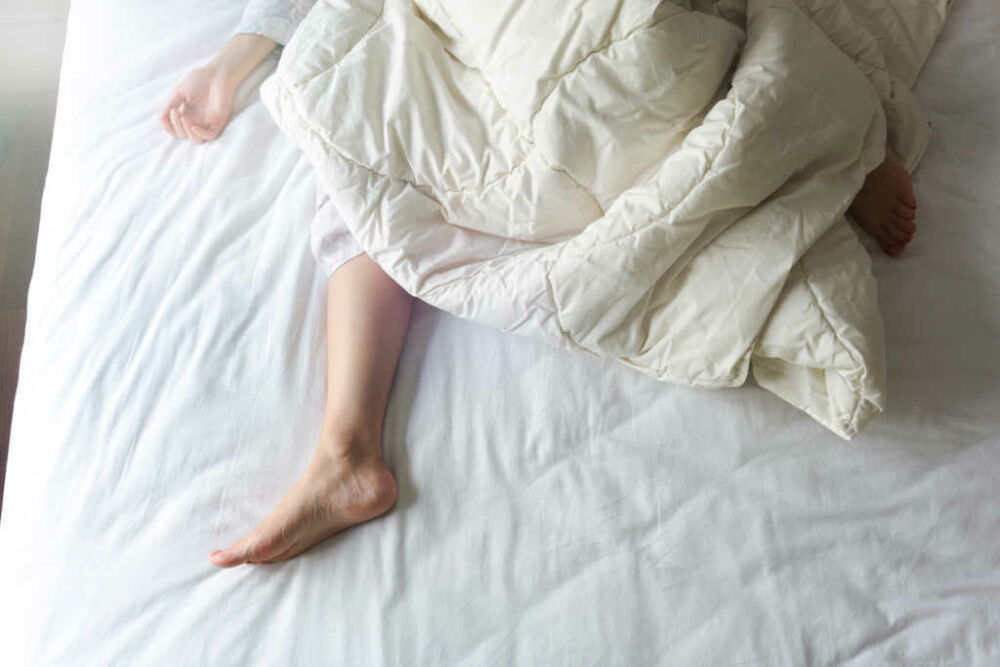
Treatment for Restless Legs Syndrome
Restless Legs Syndrome (RLS) is a common condition, affecting 2-4% of the adult population. Although its cause is not completely known there may be an association between RLS and chronic venous insufficiency.

Restless leg syndrome can be uncomfortable and reduce your quality of life. Luckily, there are several simple lifestyle changes you can make to ease your symptoms.
Restless leg syndrome (RLS) is a neurological disorder that causes an intense, overpowering urge to move your legs. Other symptoms of RLS include twitching, aching, burning, and tingling sensations that often intensify at night or when you’ve been sitting for an extended period. Consequently, many individuals with RLS have difficulty falling and staying asleep.
92% of people with RLS have a first-degree relation with RLS, meaning that genetics is likely a key factor in developing RLS. Suppose you're related to someone with RLS. In that case, you're more likely to develop RLS symptoms at a younger age than someone without that genetic link.
However, genetics is only one potential cause of RLS. Antidepressants, anti-nausea medications, allergy drugs, caffeine, alcohol, and nicotine can increase your risk of developing RLS or worsen your symptoms. Medical conditions like depression, diabetes, fibromyalgia, hypothyroidism, kidney dysfunction, anemia, peripheral neuropathy, Parkinson’s disease, pregnancy, rheumatoid arthritis, and chronic venous insufficiency are also associated with RLS.
Luckily, there are some things you can do to ease your symptoms. Here are eight simple lifestyle changes you can make to help with RLS:
In addition to relieving RLS symptoms, exercise reduces your risk of having a heart attack, lowers your blood pressure, promotes better sleep, and lowers your risk of developing osteoporosis.
Calf stretches, front thigh stretches, and hip stretches can help minimize your symptoms. For some, jogging might help. In general, avoid doing any workouts before bed, avoid any sudden changes in your activity level, and don’t overdo it, as these may worsen your symptoms.
Since fatigue typically worsens RLS symptoms, practicing good sleep hygiene is essential. If you’re in bed, don’t watch tv, use your computer, read, or check your phone. Make sure that your bedroom is quiet, cool, dark, and comfortable, and try not to eat anything in the two to three hours leading up to bedtime, so your body has time to digest.
Your body naturally follows a biological rhythm, so aim to go to bed at the same time every night and wake up at the same time every morning. This pattern will make it easier to fall asleep at night. Try to get at least seven hours of sleep and avoid taking naps or sleeping in on the weekends, as these may throw off your sleep rhythms.
Some stimulants can worsen RLS symptoms. Try cutting back on caffeine, nicotine, and alcohol — especially before bed. Plus, these stimulants can interrupt your sleep quality. While caffeine makes it more difficult to fall asleep, alcohol can help you fall asleep but will likely cause you to wake up in the middle of the night with worse symptoms.
Giving up chocolate, coffee, soft drinks, tea, nicotine, and alcohol may not help individuals with severe RLS symptoms. However, those with mild RLS symptoms will benefit from the elimination of these stimulants.
Alternating between heat and cold can distract your muscles. Try switching between heating pads and cold compresses on your legs to help relieve discomfort caused by RLS.
Taking a warm bath or shower before bed can help relax your muscles while taking your mind off your symptoms and helping you prepare to go to sleep. If you opt for a bath, try adding sea salt, baking soda, or Epsom salt to the water.
Massaging your legs or getting acupressure can also help relax your muscles, ease pain, and improve circulation, as the pressure will push blood through congested areas. Similarly, flexing your ankles before bedtime and stretching your calf muscles can help relieve RLS symptoms.
Magnesium supplements can help individuals with RLS. Make sure to talk to your doctor before you begin taking magnesium supplements, as you may get diarrhea if you take too much magnesium.
Your stress level can impact everything from your mood to your blood pressure, so it’s not surprising that it can also affect your RLS symptoms. To reduce your stress levels and relieve your RLS symptoms, try meditating, cutting back on social media time, practicing yoga, doing aromatherapy, or spending quality time with your friends and family.
If these lifestyle changes aren’t helping your RLS, you have a few other options. Speak to your doctor about medications that increase dopamine levels in the brain. Muscle relaxants, sleep medications, and drugs affecting calcium channels may help reduce leg restlessness.
Many studies show that minimally invasive procedures that eliminate symptoms of chronic venous insufficiency are effective in treating individuals with RLS. Wearing compression stockings, undergoing sclerotherapy, or getting endovenous laser ablation can help.
If you have RLS and live near Framingham, Massachusetts, visit Center for Vein Restoration’s office. Dr. Kim is an experienced, board-certified vascular surgeon specializing in minimally invasive office procedures that treat symptoms of venous insufficiency, such as varicose veins, swelling, leg pain, itching, and restless legs. Contact us today to schedule a consultation!